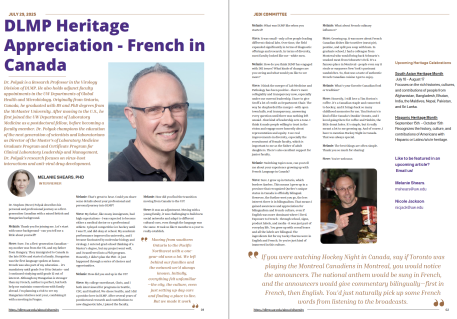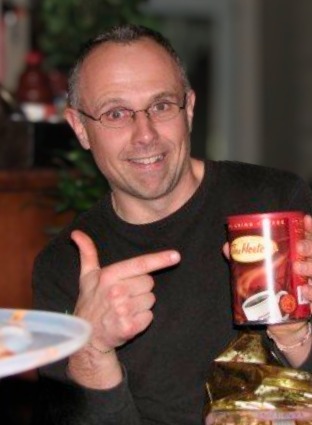DLMP Heritage Appreciation - French in Canada
August 5, 2025

Interview by Melanie Shears, PhD
Dr. Stephen (Steve) Polyak is a Research Professor in the Virology Division of DLMP. He also holds adjunct faculty appointments in the UW Departments of Global Health and Microbiology. Originally from Ontario, Canada, he graduated with BS and PhD degrees from the McMaster University. After moving to the U.S., he first joined the UW Department of Laboratory Medicine as a postdoctoral fellow, before becoming a faculty member. Dr. Polyak champions the education of the next generation of scientists and laboratorians as Director of the Master’s of Laboratory Medicine Graduate Program and Certificate Program for Clinical Laboratory Leadership and Management. Dr. Polyak’s research focuses on virus-host interactions and anti-viral drug development.

Dr. Stephen (Steve) Polyak describes his personal and professional journey as a first-generation Canadian with a mixed British and Hungarian background.
Melanie: Thank you for joining me. Let’s start with some background—can you tell me a little about yourself?
Steve: Sure. I’m a first-generation Canadian—my mother was from the UK, and my father from Hungary. They immigrated to Canada in the late 1950s and started a family. Hungarian was the first language spoken at home. French was also part of my education— it’s mandatory until grade 9 or 10 in Ontario—and I continued studying until grade 12 out of interest. Although my Hungarian is stronger than my French, neither is perfect, but both help me maintain connections with family abroad. I’m planning a visit to see my Hungarian relatives next year, combining it with a meeting in Prague.
Melanie: That’s great to hear. Could you share some details about your professional and personal journey into DLMP?
Steve: My father, like many immigrants, had high expectations—I was expected to become either a medical doctor or a professional athlete. I played competitive ice hockey until I was 17, and did okay at school. My academic performance improved in university, and I became fascinated by molecular biology and virology. I entered grad school thinking of a Master’s degree, but my project went well, and I transferred into a PhD program. Honestly, I didn’t plan the PhD—it just happened through a series of choices and opportunities.
Melanie: How did you end up in the US?
Steve: My college sweetheart, Chris, and I both interviewed for programs in Seattle, CDC, and Stanford. We chose Seattle, and I did a postdoc here in DLMP. After several years of postdoctoral research and contributions to new diagnostic labs, I joined the faculty.
Melanie: How did you find the transition moving from Canada to the US?
Steve: It was an adjustment. Moving with a young family, it was challenging to build new social networks and adapt to different cultural cues, even though the language was the same. It took us like 6 months to a year to really establish.
❝ Moving from southern Ontario to the Pacific Northwest with a one-year-old was a lot. We left behind our families and the network we’d always known. Initially, everything felt unfamiliar—the city, the culture, even just setting up day care and finding a place to live. But we made it work. ❞
Melanie: What was DLMP like when you started?
Steve: It was small—only a few people leading different clinical labs. Over time, the field expanded significantly in terms of diagnostic offerings and research. In terms of diversity, most faculty looked like me—white men.
Melanie: How do you think DLMP has engaged with DEI issues? What kinds of changes are you seeing and what would you like to see more?
Steve: I think the merger of Lab Medicine and Pathology has been positive—there’s more collegiality and transparency now, especially under our current leadership. I have to give Geoff a lot of credit as Department Chair. The way he shepherded the merger—with open town halls, real transparency, answering every question until there was nothing left unsaid—that kind of leadership sets a tone. I think it made people willing to trust in the vision and engage more honestly about representation and equity. I see real improvements in diversity, especially the recruitment of female faculty, which is important to me as the father of adult daughters. There’s also excellent support for junior faculty.
Melanie: Switching topics now, can you tell me about your experience growing up with French Language in Canada?
Steve: Sure. I grew up in Ontario, which borders Quebec. This means I grew up in a province that recognized Quebec’s unique status in Canada is officially bilingual. However, the further west you go, the less interest there is in bilingualism. That means I gained awareness and appreciation for bilingualism and French culture, even if English was more dominant where I lived. Exposure to French—through school, signs, product labels, and media—it was just part of everyday life. You grew up with cereal boxes and all the labels are bilingual. The ingredients list for my Lucky Charms were in English and French. So you’re just kind of immersed in this culture.
cereal boxes and all the labels are bilingual. The ingredients list for my Lucky Charms were in English and French. So you’re just kind of immersed in this culture.
Melanie: What about French culinary influence?
Steve: Growing up, it was more about French Canadian dishes like tourtière (meat pie), poutine, and split pea soup with ham. In graduate school, I had a colleague from Montreal who would bring back Schwartz’s smoked meat from Schwartz’s Deli. It’s a famous place in Montreal—people even say it rivals or surpasses New York’s pastrami sandwiches. So, that was a taste of authentic French Canadian cuisine I got to enjoy.
Melanie: What’s your favorite Canadian food or tradition?
Steve: Honestly, I still love a Tim Horton's coffee. it’s a Canadian staple and connected to hockey, and it brings back so many childhood memories for me. Tim Horton's is kind of like Canada's Dunkin' Donuts, and I loved going there for coffee and Timbits, the little donut holes. It's simple, but it really meant a lot to me growing up. And of course, I have to mention Hockey Night in Canada. That was always special.
Melanie: The best things are often simple. Thank you so much for sharing!
Steve: You’re welcome.
❝ If you were watching Hockey Night in Canada, say if Toronto was playing the Montreal Canadiens in Montreal, you would notice the announcers. The national anthem would be sung in French, and the announcers would give commentary bilingually—first in French, then English. You’d just naturally pick up some French words from listening to the broadcasts. ❞
Upcoming Heritage Celebrations
- South Asian Heritage Month
- July 18 – August 17
- Focuses on the rich histories, cultures, and contributions of people from Afghanistan, Bangladesh, Bhutan, India, the Maldives, Nepal, Pakistan, and Sri Lanka.
- Hispanic Heritage Month
- September 15th – October 15th
- Recognizes the history, culture, and contributions of Americans with Hispanic or Latino/a/x/e heritage.
Would you like to be featured in an upcoming article? Email us!
- Melanie Shears (mshears@uw.edu)
- Nicole Jackson (nicjack@uw.edu)